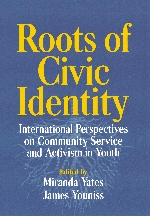Book contents
- Frontmatter
- Contents
- Preface
- List of Contributors
- Introduction: International Perspectives on the Roots of Civic Identity
- 1 Community Service and Political-Moral Discussions among Adolescents: A Study of a Mandatory School-Based Program in the United States
- 2 Social and Family Determinants of Community Service Involvement in Canadian Youth
- 3 Exploring Adolescent Altruism: British Young People's Involvement in Voluntary Work and Campaigning
- 4 Youth, Solidarity, and Civic Commitment in Italy: An Analysis of the Personal and Social Characteristics of Volunteers and Their Organizations
- 5 Political Socialization in the New States of Germany
- 6 Community Service and Social Cognitive Development in German Adolescents
- 7 Adolescents and the “Social Contract”: Developmental Roots of Citizenship in Seven Countries
- 8 Political Socialization in a Divided Society: The Case of Northern Ireland
- 9 Youth Experience in the Palestinian Intifada: A Case Study in Intensity, Complexity, Paradox, and Competence
- 10 Beyond the Call of Duty: The Service of Israeli Youth in Military and Civic Contexts
- 11 Recent Trends in Civic Engagement among Japanese Youth
- 12 Learning Politics in the Crucible: The Socialization of Taiwan High School Students as Citizens in a New Democracy
- Conclusion: Transcending Themes
- Author Index
- Subject Index
1 - Community Service and Political-Moral Discussions among Adolescents: A Study of a Mandatory School-Based Program in the United States
Published online by Cambridge University Press: 04 August 2010
- Frontmatter
- Contents
- Preface
- List of Contributors
- Introduction: International Perspectives on the Roots of Civic Identity
- 1 Community Service and Political-Moral Discussions among Adolescents: A Study of a Mandatory School-Based Program in the United States
- 2 Social and Family Determinants of Community Service Involvement in Canadian Youth
- 3 Exploring Adolescent Altruism: British Young People's Involvement in Voluntary Work and Campaigning
- 4 Youth, Solidarity, and Civic Commitment in Italy: An Analysis of the Personal and Social Characteristics of Volunteers and Their Organizations
- 5 Political Socialization in the New States of Germany
- 6 Community Service and Social Cognitive Development in German Adolescents
- 7 Adolescents and the “Social Contract”: Developmental Roots of Citizenship in Seven Countries
- 8 Political Socialization in a Divided Society: The Case of Northern Ireland
- 9 Youth Experience in the Palestinian Intifada: A Case Study in Intensity, Complexity, Paradox, and Competence
- 10 Beyond the Call of Duty: The Service of Israeli Youth in Military and Civic Contexts
- 11 Recent Trends in Civic Engagement among Japanese Youth
- 12 Learning Politics in the Crucible: The Socialization of Taiwan High School Students as Citizens in a New Democracy
- Conclusion: Transcending Themes
- Author Index
- Subject Index
Summary
This chapter focuses on community service involvement among schoolage adolescents in the United States. It discusses renewed interest in community service as a means of promoting prosocial development in participants. It then presents a theoretical approach for understanding the influence of service experience on participants. This approach connects service to identity formation in adolescence and is illustrated by a case study of a group of predominantly Black middle class adolescents who participated in a mandatory service program at an urban parochial high school. The theoretical, methodological, and social policy implications of this study's findings are discussed.
Current Interest in Community Service in the United States: Its Historical Roots and Rationale
The United States in the 1990s has witnessed a resurgence of interest in community service. This interest has taken several forms. First, Presidents Bush and Clinton both passed legislation to increase service opportunities for youth. Second, the state of Maryland as well as several cities and school districts made service hours a requirement for graduation from public high schools. A survey published in December 1995 reported that 15% of the nation's 130 largest school districts currently require service. This finding translates into required participation by some 1.2 million students (National and Community Service Coalition, 1995). Third, several national organizations and education groups such as the National Service-Learning Cooperative/Clearinghouse were established to promote the integration of service into school and university curricula. Fourth, major business corporations such as IBM funded community service programs and initiatives. Another corporate example is the Prudential Insurance Company of America, which sponsored a program in 1995 to acknowledge outstanding service commitment of schoolage youth.
- Type
- Chapter
- Information
- Roots of Civic IdentityInternational Perspectives on Community Service and Activism in Youth, pp. 16 - 31Publisher: Cambridge University PressPrint publication year: 1998
- 3
- Cited by



